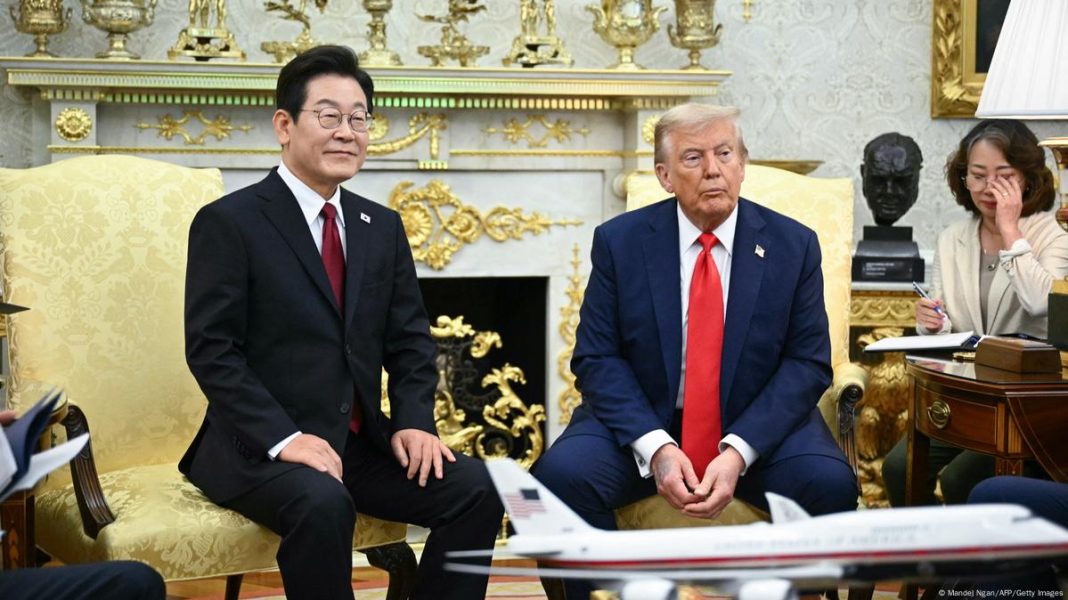South Korean President Lee Jae-myung faced a tense situation after his first high-stakes meeting with US President Donald Trump. Analysts say Lee emerged heavily burdened, as the discussions revealed deep differences between the two allies, especially on the future of the US military base presence in South Korea.
Tense White House Meeting Puts Lee Under Pressure
Lee’s spokeswoman, Kang Yu-jung, tried to present a positive picture of the meeting. She described it as a “rapport-building” get-together and said, “The summit went so well that there was no need for a joint statement.”
However, the absence of a joint statement highlighted the disagreements between Washington and Seoul, especially on the future of the 28,500 US troops stationed in South Korea. These troops are considered a key element of security in the region, but discussions around their presence remain sensitive.
Trump, known for his unconventional approach to diplomacy, added to the pressure by publicly criticizing the circumstances surrounding Lee’s rise to power. Just two hours before the meeting, Trump wrote on social media:
“WHAT IS GOING ON IN SOUTH KOREA? Seems like a Purge or Revolution. We can’t have that and do business there. I am seeing the new President today at the White House. Thank you for your attention to this matter!!!”
Trump and Japan Strengthen Military Ties with $1 Billion Arms Deal
The tweet appeared to reference investigations into former President Yoon Suk-yeol, who had been detained following his failed martial law imposition in December. Lee became president in a snap election triggered by this political crisis.
US Military Base Land Demands Spark Concern
A major focus of the talks reportedly involved the US interest in expanding or securing land for its US military bases in South Korea. Although exact details of the discussions remain undisclosed, officials indicate that the US emphasized the strategic importance of its facilities and expressed interest in additional land.
South Korea hosts several major US military base installations, including Camp Humphreys, one of the largest overseas US bases. These bases are vital for joint defense operations, missile defense, and rapid response in case of regional conflict.
US Military Watch: More Spy Planes Deployed to Track China, Russia, North Korea
Negotiating land for US military base operations has historically been a sensitive topic in South Korea. Residents near bases have often raised concerns about noise, safety, and environmental impacts. The possibility of transferring or expanding land for US use can spark political and social debate.
Analysts say the demand adds a new burden to President Lee’s administration. The issue intersects with public sentiment, national sovereignty, and the need to maintain strong ties with the United States. Trump’s approach is unconventional. It does not always follow standard diplomatic practices. This makes the challenge even more complex.
Political Tensions Over US Military Base Issues
The meeting has drawn significant public and media attention both in South Korea and internationally. The lack of a joint statement and the public comments by Trump underscore the unpredictability of diplomatic negotiations.
While Lee sought to maintain a calm and professional tone, the media highlighted the strain caused by Trump’s social media remarks. Experts point out that managing relations with the US is one of the most critical tasks for South Korea’s new president, particularly amid ongoing regional security concerns.
The combination of high-profile public criticism, complex US military base discussions, and ongoing legal investigations into former leaders has created a delicate situation. Lee must balance domestic expectations with international pressures, ensuring that South Korea’s interests are protected while maintaining the alliance with the US.
Trump’s White House Ordered Pentagon to Develop Military Options for Panama Canal
The White House meeting also highlighted the broader strategic importance of South Korea in the Indo-Pacific region. The US continues to rely on its US military base network for military operations, regional stability, and security partnerships with allies. The discussions around land use may indicate continued US interest in strengthening its presence in South Korea.
Despite the challenges, Lee’s administration has maintained a focus on diplomacy and security. Officials note that negotiations with the US are ongoing, and sensitive issues such as US military base land will continue to be a priority.
